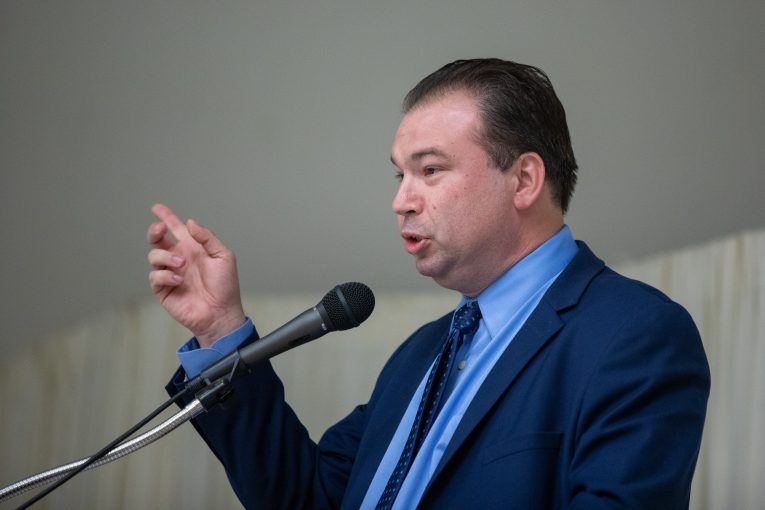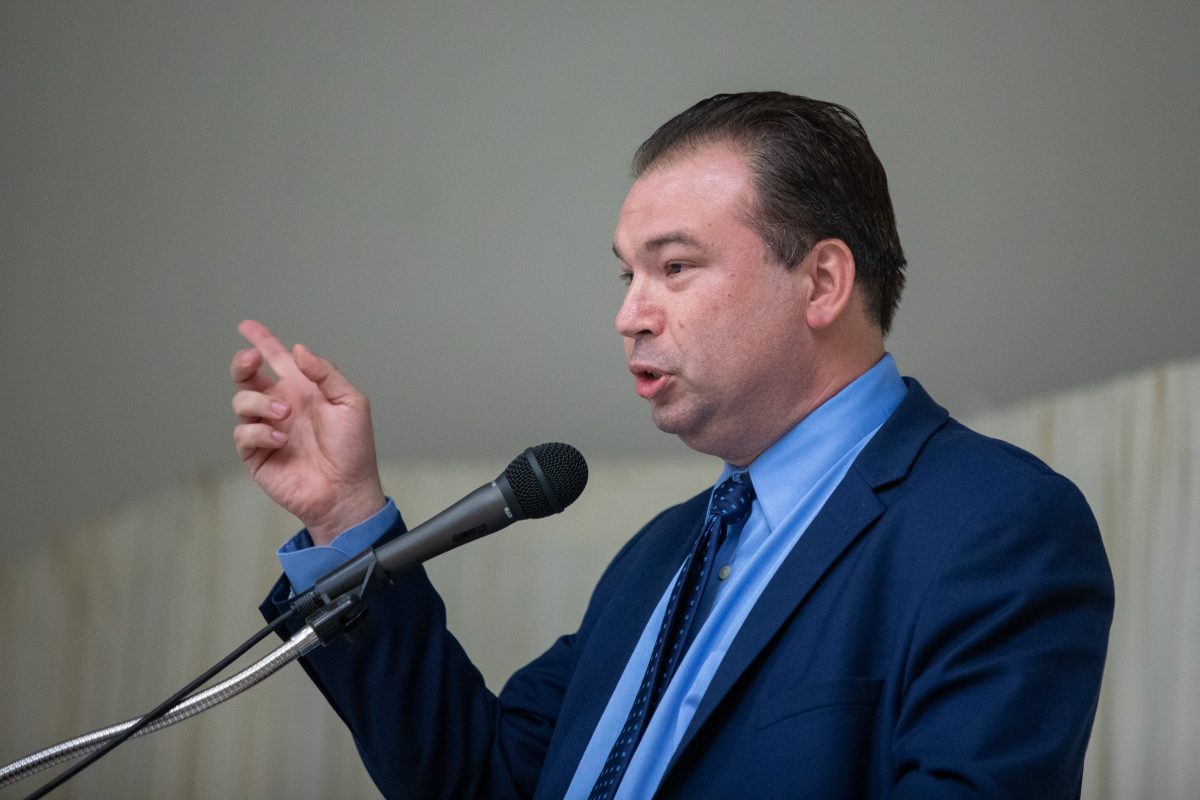

By Jeffrey Deskovic
“Looking back” will feature reprints of articles that Jeff previously wrote while a columnist at The Westchester Guardian, which encompass topics that are applicable here in CA as well as across the country and not simply applicable to NY.
On March 10, I testified before the Connecticut State Legislature which was reconsidering death penalty legislation.
Background
Connecticut passed a bill in 2009 which would have repealed the death penalty, but Gov. M. Jodi Rell vetoed the bill. However, she has announced that she will not be running for re-election, and it is contemplated that there will be a push, once again, to pass the repeal.
In order to try to hang onto capital punishment down the line, pro-death penalty advocates made a push to address legislative shortcomings now. Having previously testified before New York State legislators, I traveled to Hartford to testify.
The Legislation under Consideration
The bill sought to speed up the executions, and permit challenges to death sentences, by utilizing statistical evidence. There were two other bills simultaneously under consideration: (a) recording interrogations, but only in capital cases and class A and B felonies, and (b) a reform aimed at increasing accuracy in identifications.
Susan Storey, the Chief Public Defender in Connecticut, opposed modifying the procedures which would speed up litigation, stating that it would prevent defendants with legitimate arguments from being able to make them.  Additionally, she stated that the provision would prompt a lot of litigation, which in effect would extend timeframes.
Additionally, she stated that the provision would prompt a lot of litigation, which in effect would extend timeframes.
Karen Goodrow, the director of the Connecticut Innocence Project, testified in support of the provision pertaining to recording interrogations. She also testified in support of identification reforms, but asked the committee to go further and implement all of the best practices.
Chief State Attorney Kevin Kane testified that his office had no position on the death penalty, but that if Connecticut was going to have it, it should be able to be used. Therefore, he was supporting speeding up the process. Kane, however, opposed the identification reforms, saying that he was opposed to legislating best practices when down the line new studies might call them into question.
Kane also opposed mandatory recording of interrogations, saying that it was better to let some jurisdictions do it and others not, so as to study it. Incredibly, he further said that a red power light of a recorder could distract; the officers may not know how to use the equipment, and that the equipment could fail to work.
Dr. William Petit, Jr., whose wife and two daughters were murdered in a horrible home invasion by two recently-released parolees, has become a staunch pro-death penalty advocate. Petit testified in support of measures that would speed up executions and limit appeals, stating that, in Virginia, the time between sentence and execution is 5-7 years. Petit acknowledged that by shortening the process, some innocent wrongfully-sentenced defendants could be affected, but took the position that when weighed against the many more murder victims’ family members suffering by waiting, in his opinion, it didn’t weigh out.
Petit opposed permitting challenges to death sentences based on statistics, calling it nonsensical, because there are too few death penalty cases, and the facts of each case are what should be reviewed, and not statistics. He also indicated his opposition to the “Death Penalty Authorization Committee,” which would require district attorneys to confer and collaborate, rather than one person making the decision, a proposal aimed at removing arbitrariness and political considerations from playing a role.
Pamela Joiner’s son, Jumar, was shot and killed in 2008 in Hartford. His murderer has never been apprehended. Joiner stated that what she wanted was her son back, not revenge. Therefore, she indicated she opposes the death penalty and is against “fixing” it. She indicated her desire that the state’s resources be directed toward solving her son’s murder.
I shared that I had spent 16 years in prison in New York for rape and murder; that I had been convicted despite a negative DNA test; that my conviction had been caused by a coerced, false confession, the fabrication of other evidence, fraud by the medical examiner, and prosecutorial misconduct. I indicated that further testing identified the real perpetrator and that, if I had been 18 years old and not 16 at the time of the crime, and New York had the death penalty, that I have no doubt I would have received it.
I noted that my appeals ran out in 2001, and I was not cleared until 2006. I explained that my case was no aberration, that 250 DNA-proven wrongful convictions have occurred across the country, including three in Connecticut that did not occur until their appeals had run out: Miguel Roman, who served 18½ years for murder, Kenneth Ireland who served 19½ years for murder and sexual assault, and James Tillman, who served 16½ years for rape. In addition, there were many more non-DNA exonerations.
I told them that there was no “fixing” the death penalty and, that if they have a death penalty, innocent people would be executed, even if all of the reforms in the world were passed because, in the end, the system is run by human beings and we all make mistakes. I expressed my opposition to shortening the appeals process: pointing out that exonerations often take a long time, noting the 35 years it took for James Bain of Florida, and 27 years for Charles Chatman of Texas; and emphasizing shortening would mean catching fewer errors.
I wholeheartedly supported videotaping interrogations in all felony cases and misdemeanors, not merely in capital or class A and B felony cases. I stressed that wrongful conviction prevention should be the goal in all cases. and called for a standard of best practices in identification reform.
Senator Looney testified in support of videotaping interrogations, noting my case and other studies he had read.
Donald Connery wrote the book Guilty Until Proven Innocent, and is an anti-wrongful conviction advocate and expert. He indicated that he had been testifying for 16 years in Connecticut, calling for reforms, only to see nothing happen. He attacked Chief State Attorney Kevin Kane’s testimony, calling it excuses and nonsense, pointing out that other jurisdictions record police interrogations without a problem.
Analysis
While I feel badly for Dr. Petit, clearly his suffering colors his position. No reasonable individual can agree that it is okay to execute even one innocent person so long as speeding up executions is accomplished in order to bring more rapid closure to victim family members. Petit seems to oppose anything that would promote accuracy in the justice system, somehow seeing it as benefitting criminals. Clearly, bitterness is eating away at him; and I hope that his wounds can someday heal and bring him to a more justice-oriented viewpoint. Anti-wrongful conviction advocates are not his natural opponents, both seek justice. However, the adopting of extreme positions and giving in to a desire for revenge are what cause opposition.
Pamela Joiner, on the other hand, has clearly risen above her own tragedy. Her advocacy is admirable, and one can sense her inner peace. I thought Donald Connery’s testimony was profound.
Jeffrey Deskovic, Esq, MA, is an internationally recognized wrongful conviction expert and founder of The Jeffrey Deskovic Foundation for Justice, which has freed 9 wrongfully convicted people and helped pass 3 laws aimed at preventing wrongful conviction. Jeff is an advisory board member of It Could Happen To You, which has chapters in CA, NY, and PA. He serves on the Global Advisory Council for Restorative Justice International, and is a sometimes co-host and co-producer of the show, “360 Degrees of Success.” Jeff was exonerated after 16 years in prison-from age 17-32- before DNA exonerated him and identified the actual perpetrator. A short documentary about his life is entitled “Conviction“, and episode 1 of his story in Virtual Reality is called, “Once Upon A Time In Peekskill“. Jeff has a Masters Degree from the John Jay College of Criminal Justice, with his thesis written on wrongful conviction causes and reforms needed to address them, and a law degree from the Elisabeth Haub School of Law at Pace University. Jeff is now a practicing attorney.
